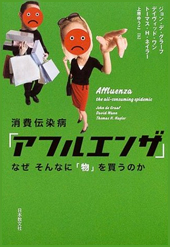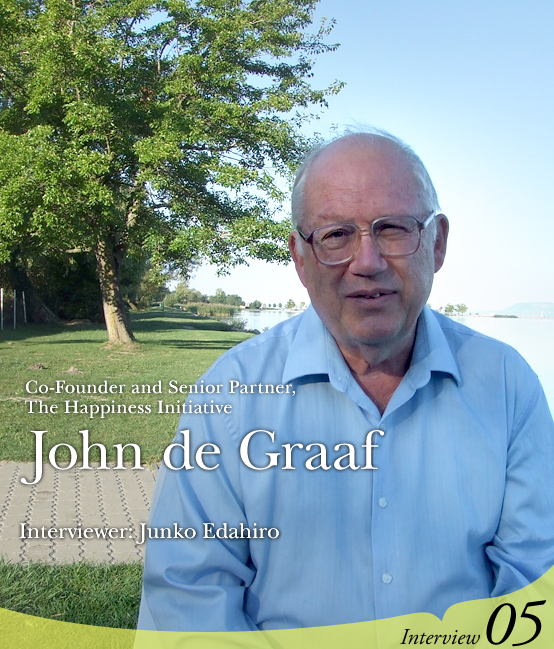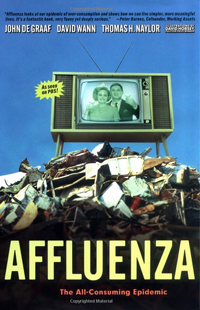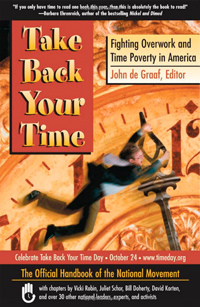- Junko :
- Thank you very much for your time.
- John :
- My pleasure.
- Junko :
- I'd like to know how your career and activities have developed. I mean how you came to do something about consumption, society and happiness. Maybe it's a long story, but could you tell me some of the highlights?
- John :
- Sure. I've been a filmmaker for way over 30 years now. If I was an activist my activism was completely through the films and what the films had to say. Then in 1997 I made the film Affluenza about overconsumption in America.
- That film, more than any other film that I did, received quite a lot of public response. It struck a chord with people. They were concerned about it. So I was asked to speak in many places, and I got very interested in that and in being an activist again and engaging people in conversations about the subjects.
-
So from that, I wanted to do something about the issue of overconsumption, and I wanted to do it in a way that it wouldn’t be just telling people, “Oh, you shouldn’t consume things. You should sacrifice for the planet,” because I don’t think that works.
So instead, I thought about what are people sacrificing now in order to have all of this stuff, and what I really believed.
In the United States at least, I believe that they were sacrificing more time, that they were working longer and longer hours. They were sacrificing family life and health, the environment, all of these things to this.
- John :
- So I began work on the issue of time, started the organization Take Back Your Time, did Take Back Your Time Day.
- Then I found that policymakers in particular didn't respond very well to the issue of time, and even many people didn't. Even though it was one of the biggest problems for them, they didn't see it as something that you could address in any kind of serious way. They just thought it was the way life was.
-
So, because of my work on the issue of time, I've kind of became a time expert. That's a little easy these days. So in the United States, still today, every year I'm in The New York Times, The Los Angeles Times, the Wall Street Journal, at some time of the year, usually the summer, talking about vacations and why Americans need more vacation time.
In 2009, I was invited to Brazil to speak at a Gross National Happiness conference as an expert on time balance, because the conference was based around the nine Bhutan domains (psychological well-being, time use, community vitality, cultural diversity and resilience, health, education, ecological diversity and resilience, living standard, good governance). That’s when I met people who were interested in the whole issue of happiness, that got very excited. I said, “Maybe this model can be a better way to draw people into the conversation.”
Since then I've found that that really is true, using a survey that came from Bhutan and was shortened for us. I used that to survey people in the city of Seattle and other places in the United States, and it turns out that the very lowest score across the board, across the country is in the issue of time balance.
- Junko :
- I see.
- John :
- So these things for me all come together. People are driven by this drive to consume, by all the messages that say to consume.
- In order to consume, they have to work more and more. When they work more and more, they neglect their relationships, which are the most essential things for happiness and so well being declines. It's a vicious circle, as we say.
- Junko :
- Right.
- Junko :
- So in the first place, what triggered you to work on Affluenza, overconsumption?
- John :
- Well to be quite honest with you, I was asked to do that project.
- Actually I had done a film about time, because I've always been interested in the issue of time. I've always thought that we didn't have enough leisure time in the United States, that we were too rushed as a society. So I made a film for our national public television called Running out of Time in 1994, about why Americans needed more vacations.
- That movie was quite successful, and that led to Vicki Robin who wrote Your Money or Your Life, coming to the premier screening of that film. She came down from the audience at the end of the film, put her hands on my shoulders and said, "John, you need to make a movie about overconsumption, and I can help you find the money." I said, "Vicki, you just said the magic words. Come to the TV station and let's talk about this."
- So indeed, Vicki Robin then connected me to the Pew Charitable Trusts that were interested in sustainable consumption, and they gave me a little grant to develop an idea about overconsumption, which at first I called, "The Goods Life." But then in the middle of making the film I came upon this word, "affluenza" and thought, "This is the word for this." It gave me a new way to structure the film.

"Affluenza" (Japanese edition)
- Junko :
- The word fits perfectly.
- John :
- Affluenza became a big U.S. television hit. Andy Warhol said you get your “15 minutes of fame.” Affluenza was my 15 minutes.
- Junko :
- Right, yeah. It also went on in Japan.










